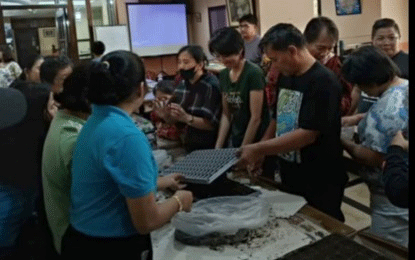In a bid to promote sustainable urban agriculture and boost the income of farmers in the Cordillera Administrative Region (CAR), the Department of Agriculture (DA-CAR) has launched a training program focused on hydroponic farming. At least 60 farmers from the Benin Farmers Association in Barangay Pinsao and the Pagbiyagan di Umili Organization in Barangay Dontogan are currently participating in the three-day training, which began on September 10. The training is part of the government’s broader effort to ensure food security while providing additional income opportunities for farmers.
Dr. Aida Pagtan, Chief of the Regional Agriculture and Fisheries Service (RAFIS) at DA-CAR, emphasized that the program is designed not only to meet the food needs of Filipino families but also to reduce household food expenses by encouraging the production of healthy vegetables. “It is always for food sustainability and reducing the family’s expense on food, especially vegetables that are healthy,” said Pagtan.
The hydroponic farming system, which grows plants without soil, is being introduced as a solution to limited space in urban settings and as a more efficient means of producing vegetables. Two greenhouses, each measuring 8 by 18 meters, are being constructed under the program at a cost of PHP1.2 million. These greenhouses are equipped with solar panels, enabling the watering systems to operate without relying on electricity, further reducing operational costs.
According to Pagtan, projections from urban gardening experiences suggest that a 250-square-meter hydroponic area planted with lettuce can generate an income of PHP250 per crop cycle. With nine crop cycles possible in a year, farmers could earn PHP10,000 in sales, with operating costs of only PHP3,000. This translates into a clear opportunity for farmers to not only feed their families but also generate additional income from the surplus produce.
“Conventional urban gardening already provides income, and with the introduction of hydroponic technologies, we expect even better financial returns. This is why the DA is scaling up urban agriculture—not just for household consumption but for income generation and food production for others,” Pagtan explained.
In addition to the hydroponics training, the DA plans to expand its efforts to schools through the “Gulayan sa Paaralan” (School Vegetable Garden) program, which aims to involve the youth in food production and agricultural practices. Engaging younger generations in farming activities is seen as a crucial step in ensuring long-term food security and creating a culture of sustainability.
Emy Lou Cunning, from the field operations division of DA-CAR’s National Urban and Peri-Urban Agriculture Program (NUPAP), shared that the greenhouses under construction will offer significant advantages in terms of crop production. The hydroponic system allows green leafy vegetables to mature about five days faster than in conventional farming methods, ensuring higher and quicker yields for the farmers involved.
The training program also includes guidance on entrepreneurship and marketing strategies, enabling farmers to capitalize on their production. The association members are expected to work in shifts to maintain the greenhouses while continuing their conventional farming practices, ensuring a smooth transition to this more efficient method of food production.
Hydroponic farming offers a promising opportunity for farmers in the Cordillera Administrative Region to enhance their productivity and increase their income. With the potential to shorten crop cycles, reduce operating costs, and increase yields, this innovative technology could reshape the future of urban agriculture. By combining modern techniques with entrepreneurial skills, these farmers are on the path to sustainable, profitable farming that contributes to food security for both their families and their communities.










